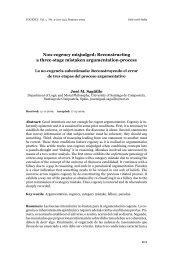Cogency v2 n2
Cogency v2 n2
Cogency v2 n2
You also want an ePaper? Increase the reach of your titles
YUMPU automatically turns print PDFs into web optimized ePapers that Google loves.
COGENCY Vol. 2, N0. 2, Spring 2010<br />
sues in discussions about natural law and natural rights, which McIntyre<br />
dismissed as fictions in After Virtue (hereafter AV).<br />
The book has ten chapters. The first and final chapters were written by<br />
MacIntyre. Chapter 1, “Intractable Moral Disagreements” introduces the two<br />
major themes of the book: why do contemporary moral debates seem so<br />
intractable? Can Natural Law resolve these disagreements more rationally<br />
than post-Enlightenment modernist moral theories seem able to? The first<br />
chapter is followed by articles from eight different scholars from different<br />
disciplines united by their commitment to Catholic Christianity who wish<br />
to be involved in inter-religious dialogue as well as dialogue with secular<br />
philosophers, especially those of Kantian, Utilitarian and Social Contract<br />
persuasion. Finally they intend to confront, albeit indirectly, problems posed<br />
by moral scepticism raised by the moral disagreements that religious and<br />
secular thinkers have engaged in for several centuries. In the final chapter,<br />
MacIntyre responds to the eight critics.<br />
2. Overview<br />
I start with chapter one, discuss three of MacIntyre’s critics and his responses<br />
to these critics in chapter ten. In chapter one, MacIntyre summarizes the<br />
Thomist-Aristotelian theory of moral reasoning, explaining why moral disagreement<br />
renders it problematic but does not refute it. Natural law claims<br />
to be binding on all humans and accessible by reason. Such claims seem to<br />
imply that there should be near universal agreement about ethical claims.<br />
However, massive historical and empirical evidence indicate that no such<br />
agreement exists. MacIntyre uses Aquinas’s theories regarding practical<br />
rationality to explain why this situation does not undermine natural law:<br />
failures to arrive at agreement occur, because of a variety of failures in practical<br />
rationality.<br />
Practical rationality is based on the first principles of natural law which<br />
entails “that good is to be done and evil to be avoided” (p. 5).While this may<br />
seem to be a miserable tautology, the list of goods is not. These goods are of<br />
the title and name he had when he proposed the idea behind the book before he became the<br />
present Pope, I will follow their example.<br />
136








